...thoughts expressed here are not necessarily final.
June 6, 2005
The Waning Mainline
Mainline Protestant churches no longer dominate a list of the 25 largest
American church groups, according to the National Council of Churches'
2005 "Yearbook of American & Canadian Churches." Pentecostal
and African American churches made significant gains, the yearbook reported,
and the Southern Baptist Convention with more than 16 million members
and a growth rate of 1.18 percent remains the second-largest denomination
in the United States. The data for the report was gathered by churches
in 2003 and reported to the yearbook in 2004. The yearbook provides information
on 217 national church bodies with 150 million members, including brief
church histories and contact information for church leaders, according
to an NCC release. Mainline Protestants have increased their mission activity
for the first time in a quarter century, the report said, and American
Christians are "attempting great things" in missions. Mainline
church agencies reported an increase of 600 missionaries over the number
reported in 1966, the release said. Of the roughly 6 billion people on
earth, about 33 percent consider themselves Christians. For more information
on the yearbook, visit www.ncccusa.org.
Awesome God
|
I saw a wonderful National Geographic special last night entitled "In the Womb. If it comes on in your area, check it out- It elicits praise and glorifies God without trying. It features 4 D imaging and computer generated images of a baby girl in the womb. It is the best testimony to God's hand in knitting together the human body I can think of. Featuring pioneering medical imaging technology, called 4-D ultrasound, which shows the fetus as it sucks its thumb, blinks, yawns, smiles, and moves in real time inside the womb, In the Womb also includes stunning images from in-utero surgery as a doctor inserts a fetoscope through the mother's womb and into the fetus to correct a congenital defect. |
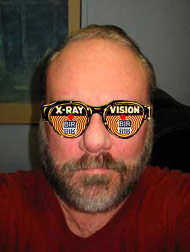 |
ABC Explores The Resurrection
Baptist
Press article...
Here's the CT
weblog review
During the May 20 installment of ABC's "20/20," anchor Elizabeth
Vargas explored the historical evidence of the resurrection of Jesus Christ
by consulting historians and biblical scholars of various persuasions.
Vargas' report was neither comprehensive nor conclusive, according to
television reviewer Glenn
Garvin of The Miami Herald, but she managed to weave "a fascinating
narrative from the most mundane details of the crucifixion." Some
commentators were convinced the resurrection did not happen, or if it
did, it was only spiritual and not physical. One said Jesus was never
really buried in the tomb where he supposedly rose, and another said the
body was surely stolen. But some stood firm in their conclusion that Jesus
conquered death, as the Bible says, despite a reluctance of the human
mind to grasp such a concept.
Even John Shelby Spong, the controversial Episcopal Bishop Emeritus of
Newark, N.J., nudged toward the resurrection. "I don't think that
most of the Resurrection narratives in the New Testament are historical
at all," he said. "But I don't think there would have been a
New Testament or a Jesus movement had there not been some astonishing
experience of power that caused these people to see Jesus in a way they
had never seen Him before."
Books sales and book influence are two different factors. While bestseller lists identify the books that generate the greatest revenue, a new survey by The Barna Group, conducted among a nationwide, representative sample of Protestant pastors, shows that the most influential books often fail to reach the bestseller lists. That’s one of several key findings drawn from the list of books that pastors say have influenced them the most in the past three years.
Although the numerous books cited by pastors were authored by dozens of writers, there were only ten authors who were listed by at least 2% of the pastors interviewed. Not surprisingly, Rick Warren was king-of-the-hill in this listing, as his books were mentioned by 30% of the pastors. John Maxwell was the runner-up, with books listed as among the most helpful by 5% of pastors. Five writers were mentioned by 3% of the nation’s church leaders: Henry Blackaby, Jim Cymbala, Bill Hybels, Andy Stanley, and Phil Yancey. The other influential authors were George Barna, John Eldredge and John Piper, each of whom was mentioned by 2%.
Here is the weekly blog a bit late, but images are on the way...
Jesus as the Prophet, Priest and King
When one considers the Old Testament offices of
prophet, priest, and king and their relation to the Christ, it is good
to remember that nothing God sets forth in redemptive history is arbitrary.
Throughout the history of redemption God has utilized the warp and woof
of life and has imposed his designs upon the fabric of nature in such
a way as to prepare man to receive the full revelation of God in Christ.
Therefore, Christ is not only the New Testament fulfillment of these old
covenant offices, the offices themselves derive from the very nature of
Christ’s person and work and are a form of revelation pointing back
to Him. He is not conformed to them, in fact the reverse is true. This
is not merely analogical nor simply typical in nature. In the person and
work of Christ we see how all of reality consists. The nature and scope
of our redemption are not merely acts in space and time; they are a personal
expression of the very heart of God ever working to secure the glory due
him and in the process yielding the greatest joy in the universe for his
people: eternal life in God's presence through union with Christ. The
holistic and interrelated nature of the three offices form a sort of three
stranded cord or knot that secures our redemption. Perhaps it would be
good to start at the beginning.
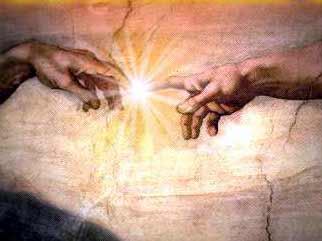 |
At creation, God said that all he surveyed was good and very good. Man was created with the ability and propensity to know God: To know his mind, his will and thoughts and freely communicate with God. He worshipped God by his very nature, reflecting glory back to God. Man was created to rule over the rest of creation and did so in the stead of God perfectly. |
Adam was a kind of prototypical prophet, priest,
and king, who spoke the names of the animals, exercised direct contact
with the Creator, walking with Him in the dew of the morning, and ruled
over the creation as God’s vice-regent on earth.
When the rupture with God came, all this changed. When man chose to doubt
God’s word to him and even embellish it, the ability to know that
wrong existed came into man’s being. In knowing sin, man became sin.
In banishment from the garden, man forfeited the ability to keep and dispense
the word of God (prophet) and commune with God (priest), and also forfeited
the ability to rule (king) over creation and even himself. This ruined
everything, and there was no hope of doing anything that could restore
his former estate. Upon the fall of man, the God of all grace came to
Adam in what is perhaps the first appearance of the second person of the
Godhead in his intercessory role, to judge and mitigate the curse in the
protoevangelion of Genesis 3:15-17. We see in the one who sought out Adam
the sovereign king judging His creation, the intercessory priest clothing
the fallen humans in a protosacrificial covering and mitigating the curse,
and the prophetic word brought to bear in the promise of the seed of the
woman who would crush the serpent’s head.
What followed in the unfolding of the history of redemption is a coherent
unscrolling of the revelation of the God whom man was alienated from and
with whom fellowship was broken. No longer could man live in the presence
of the Holy and righteous Creator of his own accord. But God in his grace
provides the promise of a perfect prophet-priest-king to fulfill all that
is needed to reconcile God with man. In preparation for the promised one,
God established an order by which he would make it possible to anticipate
and trust in the provision of man’s only hope. The unfolding of the
Bible moves inexorably toward establishing the stage upon which the three
offices would be officially integrated into the life of God’s chosen
people. To reestablish life in the presence of Yahweh, God would birth
a people through which he would demonstrate and institute his salvation.
He would establish a means of communication- the word of God that came
to the prophets. He would establish a way of atonement and intercession
for sin in the priesthood and sacrificial system, and he would establish
his kingdom rule on earth through the anointed king of his choice. He
would do all this in the life of a people in order to demonstrate and
make knowable and recognizable His glory among the nations and to insure
his people’s ability to recognize, embrace, and trust in the reality
of the promised One when he arrived.
Men continued to corrupt the imperative to be fruitful, multiply and exercise
dominion over the earth. The Babel tower is an attempt to establish a
sovereign name for man, a way to co-opt the priestly office and to reach
into heaven on one’s own terms, and the judgment which scattered
and confused the language of mankind further pointed to the need for the
one prophetic Word from God that can unite all men in God’s Kingdom
purposes. Noah preached to his time as a prophet. The patriarchs evidence
imperfect aspects of these roles in building altars, carrying the seed
of the woman into the world, culminating with Joseph’s rule over
the most powerful nation on Earth at that time while evidencing prophetic
visionary powers, and a priestly intercessory role for his people. At
the end of the book appears a key messianic prophecy of Genesis 49:10:
“The scepter shall not depart from Judah, nor the ruler's staff from
between his feet, until Shiloh comes, and to him shall be the obedience
of the peoples.”
In the exodus, we see the most coherently typical figure (according to
the book of Hebrews) of the Old Testament: Moses, the first of the major
prophets who was also the lawgiver, the intercessor, the deliverer, the
judge. He is primarily the one who spoke for God to his newly birthed
people in the wilderness. The promise is given of one said to be like
Moses who would rise up from him in Deuteronomy 18:15-19. There God promised,
through Moses, that he would raise up a prophet from among the Jewish
people who would be like Moses"I will raise up a prophet from among
their countrymen like you, and I will put My words in his mouth, and he
shall speak to them all that I command him." This declaration led
many to inquire who this prophet like Moses would be. In Acts 3 we are
told that Jesus is the prophet who has come. For some reason Jesus denies
being "the prophet" when first approached with the question,
probably due to the fact that he was actually far more than their conceptions
allowed for. Jesus was not only the messenger of God, he was the revelation
of God and as such revelation's source.
At Sinai, we see the law instituted and then the complex sacrificial system
and Levitical priesthood whom would administer it. The entire system is
in the context of a chosen people who were created in the womb of Egypt
and delivered into a place of wilderness: spiritual aliens, since they
were estranged from their Creator, and physically, for they had no place
to call home. God progressively revealed his very character and nature
in giving of the law, not so this people could gain favor, but specifically
because sovereign electing favor was bestowed upon them. In this wilderness
sonship would be established and the specifics of the law in context (the
scriptures do not differentiate between moral and ceremonial aspects of
the law) would reveal qualities and aspects of how this people of God
would look, act, and approach the Holy one.
And so in brief, it goes. The judges, the kings and the prophets which
were to follow , as well as the people of God, Israel herself, prefigured
the coming of the one true vine of Israel in whom all the peoples of the
world would be blessed. Since Christ is the archetype and the offices
are the ectype, Christ and Christ alone was qualified to perfectly fulfill
these offices as the antitype.
The Office of Prophet fulfilled in Christ
The prophetic office functions in regard to representing God before man.
The prophet is the spokesman called by God. The vision of the prophet
was given by God and could speak to the secrets of the past, present and
future.
| Through the prophetic witness, the people of God learn of the operation of God in history, insight into the problems, mysteries, and needs of the present as well as the secrets of the future. The first great prophet Moses is said to have been the humblest man on earth and a servant of Yahweh. Jesus is the ultimate servant as well but he is superior to all according to the book of Hebrews Jesus is the Son of God (Creator of all things). As such he is the architect and head of the household Moses served in. |  |
The office of prophet was predicted for Him in
the Old testament. Jesus says in John 5 that Moses wrote of Him and that
all judgment is entrusted by the father to the Son. At the Jordan River
He is called into the prophetic office and at the transfiguration with
Moses and Elijah the great OT prophets in attendance, we are told to “listen
to him”. In the NT he is recognized as a prophet by the Samaritan
woman at the well in John 4, the people of Galilee in Luke 7, and the
multitude in Jerusalem in Matthew 21. Post resurrection on the Emmaus
road he was called “a prophet mighty in word and deed.”
In the Old Testament times , prophets functioned in at least three ways-
as predictors of the future, but also as teachers (forth-tellers) and
at times as judges and the deliverers of the word of blessing and judgment.
Moses functioned in all three of these ways typically. Christ revealed
and bore witness to the truth about God in His beatitudes, parables, and
discourses (“you have heard it said, yet I say”). Matthew 13:35
quoting Psalm 78:2 says, "This was to fulfill what was spoken through
the prophet: I will open my mouth in parables; I will utter things hidden
since the foundation of the world.”
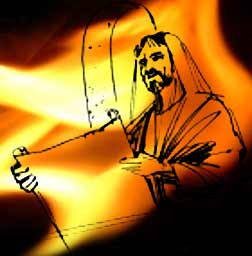 |
Jesus knew the mysteries of men’s hearts, and he prophesied about the future in both the near and eschatological contexts. Christ continues His prophetic work today through His church by means of His Spirit. As he spoke through the prophets in the Old Testament he spoke through the apostles in setting forth the new covenant scriptures and in establishing the church. |
There is no separation in the ministry of the
apostles and the body of Christ in this world and the ministry of Christ:
it is one and the same. Christ is the perfect final word of God and the
one through whom God is perfectly communicated to man. Jesus is the perfect
prophesier and the perfect word.
The Office of Priest fulfilled in Christ
The priestly office had to do with representing man before God. Since
the fall, man required an intercessor to approach the presence of God.
One of the biblical qualifications for a priest was that he had to be
from among the people so he could have compassion for the people (Hebrews
5:1-2). He was chosen by God and consecrated and set apart to God.
In Genesis we see Abel exercising priestly authority in the headship of
his family in Genesis 4:4. We are introduced to the pre-Aaronic Melchi
figure in Genesis 14 who plays such an important role later in Messianic
typology of Psalm 110 and Hebrews. This establishes the idea of an eternal
priesthood before the temporal Levitical priesthood was even instituted.
God has also given an oath that he will remain a priest forever in contrast
to the Levitical priests who died. Jesus never had to offer a sacrifice
for his own sins before he could intercede as priest, as was required
of the High Priest.
While Jesus never explicitly claimed the office of priest for himself,
it was implicit in his work. In the cleansing of the temple at the beginning
and end of his ministry, he exercised authority over the priestly purview.
In Hebrews 5:9 we are told that Jesus is made the perfect priest. Jesus
was already morally perfect, but His perfect work completely qualified
Him to be the uniquely perfect High Priest. In his High priestly prayer
in John 17 for his disciples and all believers, he interceded mightily
with the Father and pronounced a blessing and benediction on our lives.
| Jesus fulfills not only the priestly function but also the sacrificial system itself in becoming the spotless paschal lamb of the passover, and the azazel goat and blood offering of the day of Atonement. As the one in whom the Godhead bodily dwelt in pleroma he fulfills the imagery of the tabernacle and temple as well. While not a descendant of Aaron or Eliezar, he is far greater according to the book of Hebrews. In Hebrews 5 we are told that he was called of God as was Aaron. | 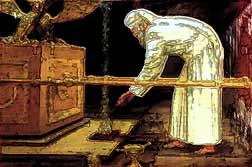 |
He fulfills the contents of the Ark of the Covenant
and becomes our mercy seat as well. He is the word, the bread and the
rod of Aaron that budded. His priesthood is superior in that His blood
actually atones and His work is finished- he sits down after making atonement.
Under the Old Covenant the High Priest had limited access into the presence
of God. It was limited in time, limited by the requirement of repetitively
pouring out blood. The scripture states this was a "shadow"
of things to come. It is impossible for the blood of bulls and goats to
take away sins. Jesus, the perfect sacrifice, entered the perfect tabernacle
of Heaven through His blood, not through the blood of animals., making
permanent access to God possible. He would establish his Kingdom and the
priesthood of all believers by his work as the perfect priest not limited
like the Levitical priesthood but after the order of Melchizedek, a priesthood
not defined by ancestry, origin in time and space or the need for repetitive
rituals which do not solve the sin problem at the root of the rupture
between man and God.
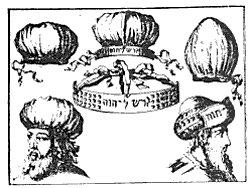 |
He fulfills the role of the priest in providing a sufficient and efficient atonement that lasts forever and is available to any who believe and receive it. He serves as the propitiation for God's wrath on our behalf (Romans 3:21ff). This in turn is interwoven with our justification since God does not declare us just on of our own accord. So Jesus is the eternal archetype mirrored in the ectype of the priesthood and he becomes the antitype by his perfect life of identification with us and his finished work on the cross. |
He eclipses the priests in every way. He is offerer
and offering. Now because Jesus ever lives to intercede for us as the
one mediator between God and man (1 Tim 2:5) we can boldly enter the throne
of grace (Hebrews 10:19) to stand. We are a kingdom, priests to our God
(1 Peter 2:5-9). Jesus' priestly work secures our atonement, our redemption,
our forgiveness, our cleansing, and our communion with and enjoyment and
worship of God. Christ is the perfect fulfillment of the priestly office
and secures our place in the presence of God eternally.
The Office of King fulfilled in Christ
God Most High is the sovereign Lord of all. He is the ideal King of Israel
and when Israel demanded a King it was in lieu of the Lordship of God
in the nation. God turned the symbol of the nation's rejection of him
into a vehicle to bring its salvation. What men meant for evil, God meant
for good. God is always sovereign, but he institutes His kingdom on earth
in a special way.
Like Adam, the King ruled for God. To be qualified to be king, he had
to be from the tribe of Judah (Gen 49:10) and eventually limited to being
from the seed of David (but not Jehoiachin : cf. Jeremiah 22:24-30) by
the Davidic Covenant (2 Samuel 7; Psalm 89:3-4). Jesus is David's greater
son, descended from David through Mary which bypasses the line of Jehoiachin
and necessitates a virgin birth in the case of Mary and Joseph (Joseph
was of Jehoiachin’s line).
| In David, God would establish an eternal kingdom that lasted beyond the destruction of the nation itself in 586 BC. The messianic thread of prophecy regarding an annointed ruler to come threads its way through Old Testament psalms and prophecy. A supernatural ruler who would restore peace was prophesied by Isaiah. | 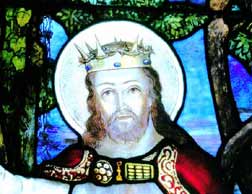 |
Micah spoke of the coming messiah as from of old
and from the ancient times. Jeremiah saw him as the righteous branch of
Jesse in Jeremiah 23. Zechariah saw him as the divine warrior.
Daniel’s visions show us the view of the rock that comes out of the
mountain and fills the earth and the Son of Man who approaches the ancient
of days and receives authority and sovereign power and glory. This Son
of Man was whom Jesus identified himself as in Mark 14:61-62 and many
other places. He sits at the right hand of the Father until all his enemies
are made a footstool for his feet. Psalm 110 is often quoted in the New
Testament. In the Revelation of Jesus Christ, we see that the kingdoms
of this world have become the Kingdom of our Lord and of Christ , and
He shall reign forever and ever!
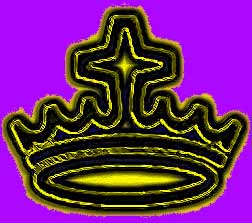 |
The Kingdom is where the King is. After his annointing at his baptism, he began to proclaim the coming of the Kingdom of God. This becomes the central theme of Jesus' preaching and the now and not yet nature of the kingdom is revealed in his Kingdom sayings and parables. The kingdom will come in power in the future. It is most clearly seen in the power of the resurrection. He has been coronated at his ascension to power and was said to endure the cross for the joy set before him. |
Philippians 2 tells us that this was to the glory
of the Father that the son should be exalted to a name above every name
and that every knee should bow and every tongue confess him as sovereign
Lord.
|
Therefore he is now the exalted savior king who sits at the right hand of God and reigns forever (Hebrews 1, 4, 7 and Psalms 2, 45, 72, 110). He is King of Kings and Lord of Lords (Rev 17 and 19). He also came to judge, to bring a sword (Matthew 10). Revelation 11 and 19 reveals him as the King/judge of the earth. He rules and reigns and will return to judge the living and the dead and to usher in the eternal Kingdom. Christ is the perfect fulfillment of the need for man to be able to bend the knee and be ruled again and to rule in the way he was created to do- as people-priests who will rule with Him forever.
|
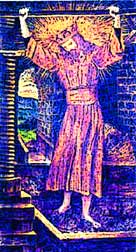 |